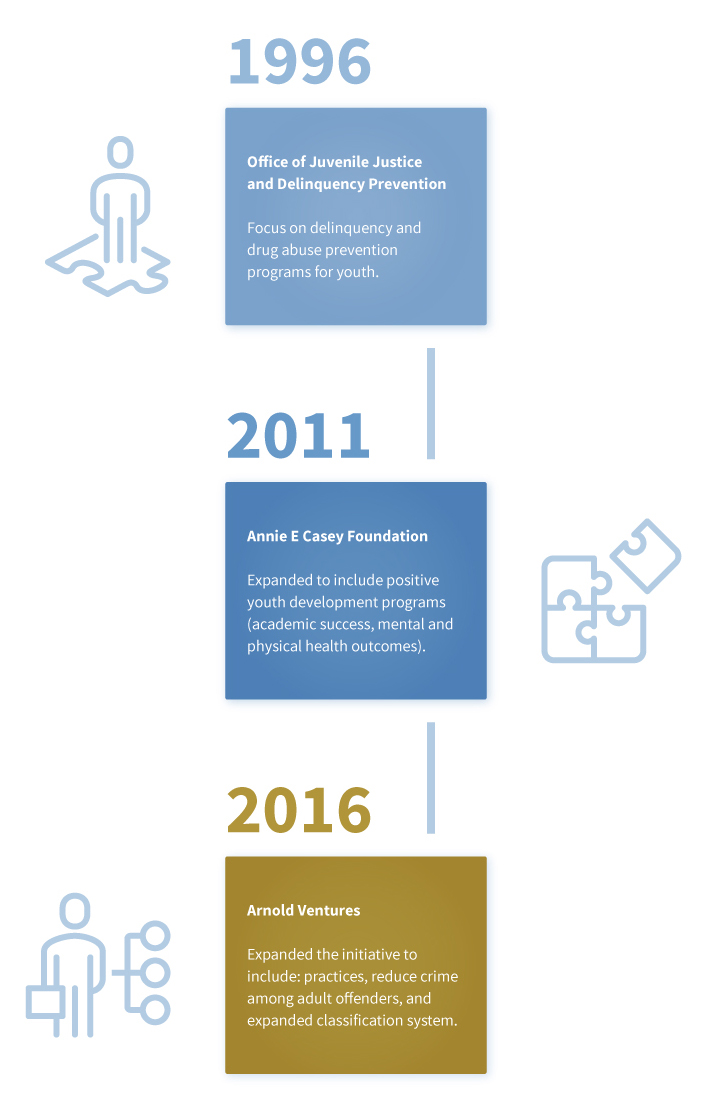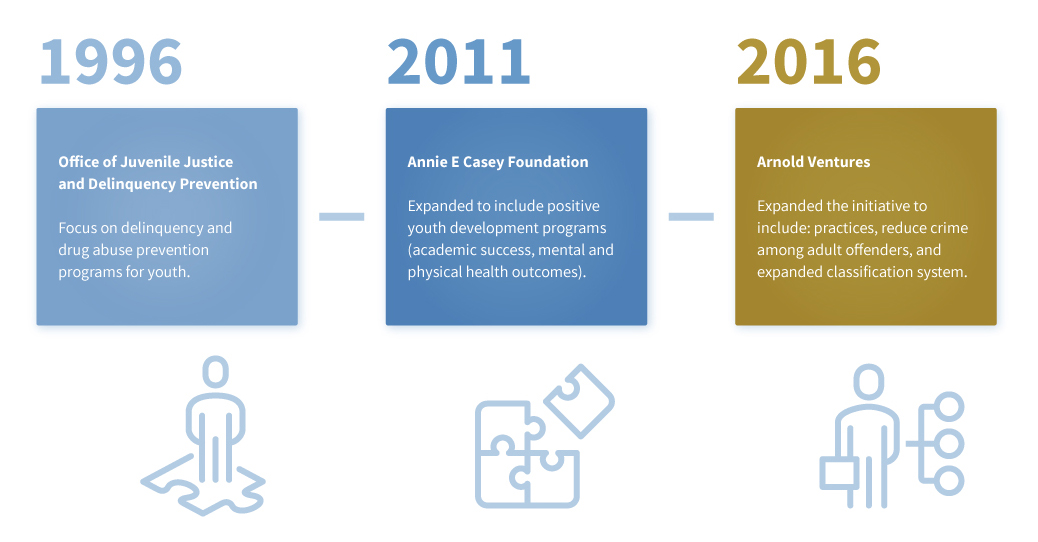
History
Blueprints for Healthy Youth Development (originally started as Blueprints for Violence Prevention) was one of the earliest efforts to establish a clear scientific standard for evaluating the evidence of a program’s effectiveness, implementing a rigorous expert review process and certifying those programs that met this standard. Launched in 1996 by internationally renowned violence researcher Dr. Delbert S. Elliott (who also founded the Center for the Study and Prevention of Violence in 1992), the early years of Blueprints focused on identifying programs that were effective in addressing violence and drug use outcomes.
Since its inception, Blueprints has expanded its scope to include mental and physical health, self-regulation, educational achievement and other positive developmental outcomes. Blueprints’ latest expansion includes a focus on reducing crime among adult offenders, thus, Blueprints interventions now target all levels of need—from broad prevention programs that promote positive behaviors while decreasing negative behaviors to highly-targeted programs for at-risk children, troubled teens or formerly incarcerated adults that get them back on track.
Blueprints for Healthy Youth Development (originally started as Blueprints for Violence Prevention) was one of the earliest efforts to establish a clear scientific standard for evaluating the evidence of a program’s effectiveness, implementing a rigorous expert review process and certifying those programs that met this standard. Launched in 1996 by internationally renowned violence researcher Dr. Delbert S. Elliott (who also founded the Center for the Study and Prevention of Violence in 1992), the early years of Blueprints focused on identifying programs that were effective in addressing violence and drug use outcomes.
Since its inception, Blueprints has expanded its scope to include mental and physical health, self-regulation, educational achievement and other positive developmental outcomes. Blueprints’ latest expansion includes a focus on reducing crime among adult offenders, thus, Blueprints interventions now target all levels of need—from broad prevention programs that promote positive behaviors while decreasing negative behaviors to highly-targeted programs for at-risk children, troubled teens or formerly incarcerated adults that get them back on track.
Blueprints timeline:
Founded in 1996, Blueprints began with start-up funding from:
- Center for Disease Control and Prevention,
- Pennsylvania Commission on Crime and Delinquency,
- Colorado Division of Criminal Justice, and
- Office of Juvenile Justice and Delinquency Prevention (which went on to provide long-term funding).
In its early years, Blueprints identified an initial list of effective programs containing only 10 delinquency and drug abuse programs that met our scientific standard of evidence.
In 2011, with funding from the Annie E. Casey Foundation, Blueprints outcomes were expanded to include academic success and mental and physical health outcomes.
In 2016, funding from the Laura and John Arnold Foundation (now Arnold Ventures) supported three major expansions to the Blueprints initiative:
1. Evidence-Based Practices & Policies Certification
Based upon our Advisory Board’s recommendation, Blueprints began certifying evidence-based practices and policies (considered a general category of strategies that share common features but leave some room for variation in implementation), in addition to programs (as in those with a developed set of manuals and delivery protocols, along with provision of training and technical assistance).
2. Focus on Adult Crime Offenders
Blueprints expanded its scope to include a focus on interventions designed to reduce crime among adult offenders, with an emphasis on identifying high-quality studies of interventions shown to reduce the risk of reoffending or other outcomes associated with recidivism, including employment, mental health and substance use outcomes to include the certification of adult crime prevention programs, practices and policies.
3. Registry to Include Non-Certified Interventions
Blueprints expanded its classification system to include information on interventions reviewed but lacking strong evidence. The term “evidence-based program (EBP)” no longer denotes a clear standard, but increasingly refers to the whole continuum of evidence from anecdotal evidence to client satisfaction ratings and practitioner experience, to correlational evidence to experimental evidence. Only true experimental evidence justifies the claim that there is a causal link between the intervention and the outcome of interest and we believe legitimate claims of program effectiveness require experimental evidence. As such, the Blueprints registry now offers information on a continuum of experimental evidence, from having no credible evaluations, to having inconclusive evidence, to having very strong experimental evidence. In addition, the registry identifies programs with strong experimental evidence of harmful effects.
In 2019, Blueprints launched a new website, with support from Arnold Ventures, in order to fulfill our mission to provide a comprehensive registry of evidence-based interventions that are effective in reducing antisocial behavior and promoting a healthy course of youth development and adult maturity.
Blueprints timeline:
Founded in 1996, Blueprints began with start-up funding from:
– Center for Disease Control and Prevention,
– Pennsylvania Commission on Crime and Delinquency,
– Colorado Division of Criminal Justice, and
– Office of Juvenile Justice and Delinquency Prevention (which went on to provide long-term funding).
In its early years, Blueprints identified an initial list of effective programs containing only 10 delinquency and drug abuse programs that met our scientific standard of evidence.
In 2011, with funding from the Annie E. Casey Foundation, Blueprints outcomes were expanded to include academic success and mental and physical health outcomes.
In 2016, funding from the Laura and John Arnold Foundation (now Arnold Ventures) supported three major expansions to the Blueprints initiative.
1. Evidence-Based Practices & Policies Certification
Based upon our advisory board’s recommendation, Blueprints began certifying evidence-based practices and policies (considered a general category of strategies that share common features but leave some room for variation in implementation), in addition to programs (as in those with a developed set of manuals and delivery protocols, along with provision of training and technical assistance).
2. Focus on Adult Crime Offenders
Blueprints expanded its scope to include a focus on interventions designed to reduce crime among adult offenders, with an emphasis on identifying high-quality studies of interventions shown to reduce the risk of reoffending or other outcomes associated with recidivism, including employment, mental health and substance use outcomes to include the certification of adult crime prevention programs, practices and policies.
3. Registry to Include Non-Certified Interventions
Blueprints expanded its classification system to include information on interventions reviewed but lacking strong evidence. The term “evidence-based program (EBP)” no longer denotes a clear standard, but increasingly refers to the whole continuum of evidence from anecdotal evidence to client satisfaction ratings and practitioner experience, to correlational evidence to experimental evidence. Only true experimental evidence justifies the claim that there is a causal link between the intervention and the outcome of interest and we believe legitimate claims of program effectiveness require experimental evidence.
As such, the Blueprints registry now offers information on a continuum of experimental evidence, from having no credible evaluations to having inconclusive evidence, to having very strong experimental evidence. In addition, the registry identifies programs with strong experimental evidence of harmful effects.
In 2019, Blueprints launched a new website, with support from Arnold Ventures, in order to fulfill our mission to provide a comprehensive registry of evidence-based interventions that are effective in reducing antisocial behavior and promoting a healthy course of youth development and adult maturity.

